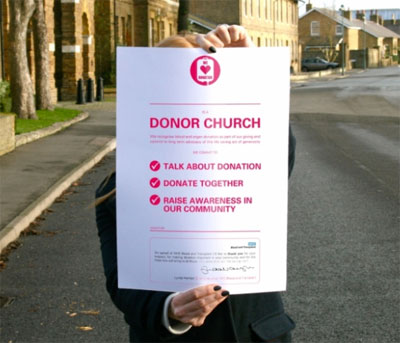Are your kidneys available to me? - Third in a series
 To paraphrase a truism, churches can be very generous when it comes to other people’s organs.
To paraphrase a truism, churches can be very generous when it comes to other people’s organs.
There are churches in the United Kingdom (not sure about USA yet) that canvas their members for organ donations! Unbelievably, the program is called the Flesh and Blood (fab) campaign. The online article states:
In the past year, an estimated 30,000 churches of all denominations have received information about the fab campaign, and many have taken part in raising the profile of donation. They are equipped to be long-term advocates of donation and provided with practical tools and resources to help churches donate together and generate conversation and discussion about blood and organ donation. (ref)
Yet, there are MANY reasons to NEVER be a kidney donor — Read some of the articles linked in the Living Donor 101 news feed on the bottom right of this webpage.
You wouldn’t think that donating a kidney would be risky since churches endorse the procedure and practice. Or, perhaps that helps it to be viewed as a sacrificial act?
On the UNOS (United Network for Organ Sharing) website, we find that:
Research into the positions of various religious groups reveals the underlying attitude that unless the group has taken action to prohibit organ or tissue donation and transplantation, it is usually assumed that such donation is permissible. Donation is encouraged as a charitable act that saves or enhances life; therefore, it requires no action on the part of the religious group. (ref)
UNOS presents the positions of many denominations. The Assembly of God statement includes an evangelical ethic:
A fascinating possibility is to imagine the impact if Christian donors were to stipulate that their donated organs be accompanied by a handwritten letter telling of the donor’s life, testimony, and relationship with Christ.
The Presbyterian Church resolved that all Christians should donate:
Therefore, be it resolved that the Presbyterian Church (U.S.A.) recognize the life-giving benefits of organ and tissue donation, and thereby encourage all Christians to become organ and tissue donors as a part of their ministry to others in the name of Christ, who gave life that we might have life in its fullness…
The United Methodist Church states that organ transplantation is an act of charity but if the medical people are not offering it for free, how could this be true?
We believe that organ transplantation and organ donation are acts of charity, agape love, and self-sacrifice. We recognize the life-giving benefits of organ and other tissue donation and encourage all people of faith to become organ and tissue donors as a part of their love and ministry to others in need.
On UNOS, Christianity, the general category, shows support for organ donation. The Bible passage quoted presumably conflates gifts of healing with donating one’s organs.
The Lord demonstrated with his own life how, even in sorrow, love enables us to embrace the needs of others. We can choose to donate our organs to save the lives of many people. The decision to donate at the end of life is the beginning of healing for many others. Healing and saving life is a great gift. Jesus sent his 12 disciples out with the imperative to heal disease and illness: “Heal the sick…freely ye have received, freely give.” (Matthew 10:8)
Catholics are especially tender in these matters. I was told of a pro-life organization where a staff member needed a kidney and 20 people in the office volunteered to donate. That gave plenty of options for the medical people to find a match. UNOS quotes His Eminence Edward Cardinal Egan, Archbishop of New York:
When asked to share my thoughts on the importance of organ donation for this publication, it was Evangelium Vitae that immediately came to mind. In thinking about the glorious gift of life God has given each of us, it would seem that one of the greatest ways an individual can honor that gift is by making a conscious decision to be an organ donor—a decision that enables another’s life to continue—and in a very real and tangible way promotes ‘a culture of life.’
Christians are led to believe and pressured to acknowledge that the generous, loving, believing, giving, self-sacrificing child of God will donate organs. And we all know what the opposite of that is!
Probably most church people assume that these statements apply to dead (nearly dead) donors, not to live ones. Yet soft-hearted people will be drawn to donate a kidney and their act will be influenced by church approval.
Kidney donation news story (ref)
Another story (ref) (Just Google for more)
But not all kidneys come from the willing and compassionate. Stay tuned for part two of Other People's Organs.
Prev | Next